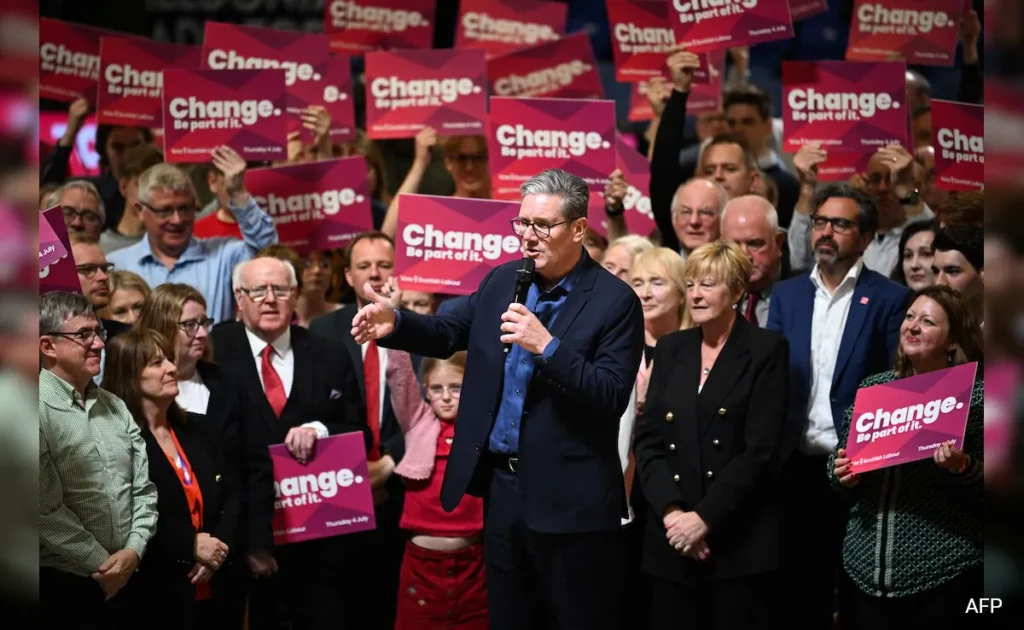Labour’s Historic UK Election Win Reshapes Political Landscape in 2024
In a stunning shift that has captured the attention of political analysts, voters, and news outlets worldwide, the Labour Party has secured a historic win in the 2024 UK General Election. This victory marks a seismic change in British politics, as Labour returns to power with a clear and resounding majority—one not seen in over a decade.
What does this mean for the UK’s future? Where do the key parties stand post-election? And how is this change being felt by real people on the ground?
In today’s post, we’ll break down what you need to know about the biggest political story of the past 24 hours: Labour’s historic win in the UK General Election and what it means for everyday Brits and the global stage.
How Big Was Labour’s Victory?
To fully understand the magnitude of Labour’s win, let’s look at the numbers:
- Labour secured over 400 seats in the House of Commons, giving them a strong and workable majority.
- The Conservative Party suffered one of its worst defeats in modern British history, falling below 150 seats.
- Smaller parties like the Liberal Democrats and the Green Party also made gains, but none close to Labour’s performance.
This wasn’t just a win—it was a political earthquake. The UK hasn’t seen a Labour landslide like this since Tony Blair swept to power in 1997.
Quick timeline of election night:
- 10:00 PM: Exit polls showed Labour surging across the UK.
- 12:30 AM: Early results from northern swing constituencies confirmed the trend.
- 4:00 AM: Official declarations began pouring in, cementing Labour’s majority.
- 6:15 AM: Prime Minister Rishi Sunak conceded defeat.
Why Did Labour Win So Big?
If you’re thinking: “What changed the political mood so quickly?”—you’re not alone. The 2024 election brought to light deep-seated frustrations across Britain.
Here are some of the key reasons why voters turned to Labour:
- Cost of living pressures: With skyrocketing energy bills, grocery prices, and housing costs, many Brits felt the squeeze. Labour promised focused support for working and middle-class families.
- Healthcare concerns: Long NHS wait times became a flashpoint, and Labour’s pledge to invest in health services resonated widely.
- Political fatigue: After 14 years of Conservative rule, many voters were simply ready for change—some described it as a “political reset.”
- Scandals and leadership woes: The Conservative government had faced multiple high-profile scandals, which eroded public trust.
One voter from Manchester put it simply: “It just felt like the Tories stopped listening. Labour gave us hope again.”
Meet the New Prime Minister: Who is Keir Starmer?
If you haven’t followed UK politics closely, you might be wondering: Who is Keir Starmer, and what does he stand for?
Sir Keir Starmer is a former lawyer and prosecutor turned Labour leader. Since taking over leadership in 2020, he’s worked to rebuild the party’s credibility, particularly among centrist and working-class voters.
His platform promised “calm competence”—an approach that stood in stark contrast to the political turbulence of recent years.
Key areas Starmer has pledged to focus on:
- Rebuilding the NHS with more staff, quicker appointments, and better funding.
- Strengthening the UK economy through green industry initiatives, job creation, and tax reform.
- Fixing broken public services like transport, education, and housing.
- Integrity and ethics in politics, vowing to restore public trust in government.
During his victory speech outside No. 10 Downing Street, Starmer declared:
“Today, we begin a new chapter—not just for government, but for the British people. Change will not come overnight, but it will come.”
What Now for the Conservative Party?
It’s no exaggeration to call this result a big wake-up call for the Tories. After more than a decade of leadership, the party now finds itself in uncharted territory—as the opposition, and seeking to rebuild from what many are calling a historic low point.
Immediate aftermath includes:
- Rishi Sunak stepped down as party leader shortly after the defeat.
- A leadership contest has already begun, with names like Penny Mordaunt, Suella Braverman, and Tom Tugendhat in the mix.
- Calls for a generational reset within the party, to reconnect with young voters and modernize.
One former MP described the mood within party ranks as “sobering but necessary.” The hope? To come back stronger, with a clearer message and renewed focus.
How Are People Reacting?
Within just hours, #LabourLandslide began trending on Twitter (now X), with millions sharing their opinions, hopes, and (yes) memes about the result.
Across the UK, the mood varies:
- Young voters expressed optimism, especially about climate policies and education reforms.
- Public sector workers welcomed promises of better funding and wages.
- Brexit skeptics and centrists saw Starmer as a stabilizing figure for international relations.
Of course, not everyone is thrilled. Some voters worry about tax increases or left-leaning economic policies affecting small businesses. It’s a delicate balancing act—but one Labour seems aware of.
What Will Change First?
Starmer’s team has already outlined a “First 100 Days Agenda,” with priorities that include:
- Emergency investment in the NHS to cut wait times.
- Launching a national plan to reduce energy bills through green energy sources.
- Re-establishing ethics watchdogs in government.
- Implementation of rent controls and building more affordable homes.
It’s an ambitious list—but one Labour insists they are prepared to deliver on.
What About Brexit, The EU, and Foreign Policy?
For many, a pressing question is whether Labour’s rise marks a pivot in post-Brexit UK politics. While Starmer has ruled out rejoining the EU, he has pledged to “reset relationships with Europe” and improve trade and diplomacy.
International responses have been largely positive. Several EU leaders, as well as US President Joe Biden, congratulated Starmer and expressed willingness to collaborate more closely.
This could signal a shift in Britain’s global stance—not back to EU membership, but toward a more cooperative tone.
What The Win Means for You and Me
Let’s bring this closer to home. Beyond the numbers, speeches, and headlines, what does all this mean for everyday folks like you and me? Here’s a breakdown:
- If you’re working full-time or struggling with bills: Labour says help is on the way through wage support and cost-of-living relief.
- If you’re a parent: Promises of new childcare support and improved school funding are on the agenda.
- If you’re a renter or buying your first home: Expect housing reforms aimed at affordability.
- If you work in the NHS or education: Better pay, more staff, and more resources could be coming your way.
Change won’t come overnight, but the direction of travel looks significantly different from just a few weeks ago.
Looking Forward: What Happens Next?
This is just the beginning. Over the next few days and weeks, we’ll see:
- New cabinet appointments and policy briefings.
- The King’s Speech outlining Starmer’s legislative vision.
- Budget adjustments and new economic forecasts.
Expect lots of scrutiny and commentary, both domestically and abroad. But for many, Labour’s promise of stability, fairness, and competence offers a fresh chapter.
Conclusion: A Turning Point for the UK
Labour’s 2024 general election win wasn’t just a political victory—it was a public declaration. Brits made it clear that they’re ready for something new. Whether that hope becomes lasting change remains to be seen, but the energy is real.
It’s too soon to say how successful this government will be. But one thing is certain: the UK has entered a new political era.
What do you think about Labour’s win?
Are you hopeful, skeptical, or cautiously optimistic? Drop your thoughts in the comments below. Let’s have a real, respectful conversation about where Britain is headed next.
Stay tuned for more updates, analysis, and reactions as this historic moment continues to unfold.
Want more content like this? Don’t forget to subscribe and follow us for breaking news, political analysis, and easy-to-understand insights into the stories shaping our world.
Keywords: Labour 2024 election, Labour UK win, Keir Starmer prime minister, UK general election results, Labour landslide, UK politics 2024, Conservatives defeat, UK political change, Labour majority Parliament



